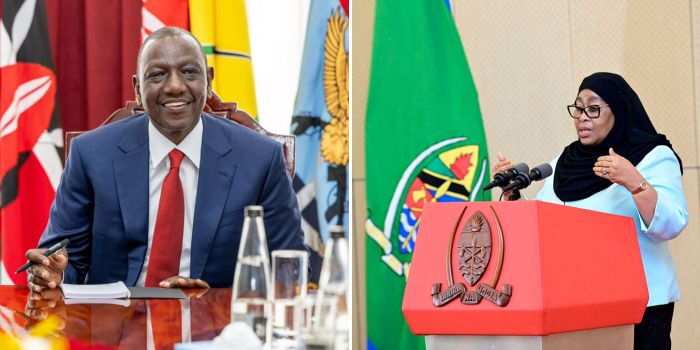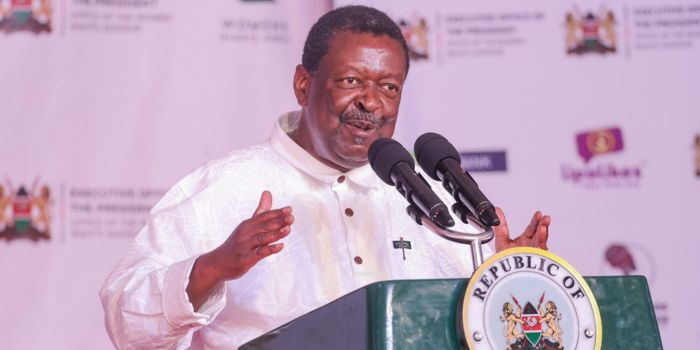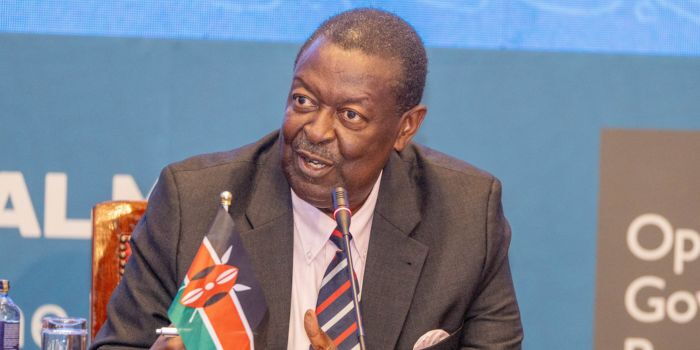In a heated moment between Kenya and Tanzania, Foreign Affairs Cabinet Secretary Musalia Mudavadi has stepped forward with a message of calm, patience, and strategy. Speaking on Thursday, August 7, Mudavadi made it clear that Kenya will first try diplomacy to solve the trade dispute with Tanzania.
The issue started when Tanzania imposed trade restrictions on foreign nationals, a move that has affected Kenyans doing business there. Many expected Kenya to respond with the same energy, but Mudavadi insists that confrontation is not the way to go, at least not yet.
During a meeting with the National Assembly Committee on Regional Integration, Mudavadi asked for patience from both lawmakers and the public. His words painted a picture of a leader who believes that talking before fighting is the smarter choice.
“Let us not demand confrontation on some of the issues. In case diplomacy does not work, I will declare its failure so that we may engage other channels,” he said. The message was clear: Kenya will talk first, but it will not be silent forever.
Some MPs at the meeting were not convinced. They pushed Mudavadi to explain whether Kenya has truly benefited from being part of the East African Community (EAC), a bloc that is supposed to make trade between member states easier.
They also wanted to know if political tensions between Kenya and Tanzania were making things worse on Migingo Island, a tiny but strategic spot in Lake Victoria that has seen disputes over fishing rights.
Mudavadi responded with facts. He revealed that Kenya has formally asked Tanzania to give Kenyan traders the same treatment Tanzanian traders get in Kenya. He pointed to a joint meeting in January between officials from both countries, where Kenya requested equal access to business passes for its citizens.
According to Mudavadi, this request was made during a meeting of Commissioners of Labour and Chiefs of Immigration from both nations, held in Kenya between January 13 and 14. The aim was to make sure Kenyan entrepreneurs can work in Tanzania without unnecessary barriers.
The Prime Cabinet Secretary defended Kenya’s approach, saying that engagement with Tanzania is not just about trade, it is about the bigger dream of regional unity. He noted that the EAC’s Customs Union and Common Market protocols have already boosted trade, investment, and infrastructure across the region.
He explained that these protocols have allowed goods, capital, and even people to move more freely across borders, creating larger markets for Kenyan businesses and reducing the cost of trade.
Mudavadi also warned about the dangers of xenophobia. He pointed to worrying examples from other African countries where foreigners have been denied medical care or discriminated against. He said Kenya should be part of the solution, not part of the problem.
“We have seen some situations in some countries where foreigners face discrimination, for example, mothers and children being denied medical treatment in hospitals. Kenya should play a role in fostering the African good,” he stated.
His words carried a strong message, unity in Africa is not just a slogan. It is a choice that requires effort, patience, and fairness in how we treat each other.
Mudavadi’s calm tone did not mean he was weak. His promise to declare diplomacy’s failure if talks do not work was a reminder that Kenya is prepared to defend its people’s interests if pushed too far.
The situation has left many watching closely to see how Tanzania will respond. If the two countries can reach an agreement, it will strengthen the EAC’s image as a serious trading bloc. If not, the diplomatic frost could turn into something much colder.
For now, Mudavadi is betting on words over walls, believing that East Africa is stronger when its nations cooperate rather than compete.
Observers note that trade between Kenya and Tanzania has grown over the years, but disputes like this one threaten that progress. The outcome of these talks could shape how both countries do business with each other for years to come.
Kenya’s diplomatic playbook seems to be built on three pillars, dialogue, fairness, and readiness to act if necessary. Whether that will be enough to melt the tension with Tanzania remains to be seen.
In the coming weeks, all eyes will be on Nairobi and Dodoma. The people of both nations hope for a handshake, not a standoff.
For Musalia Mudavadi, the goal is clear: keep the peace, protect Kenya’s interests, and remind East Africa that unity is still worth fighting for, but preferably without a fight.






